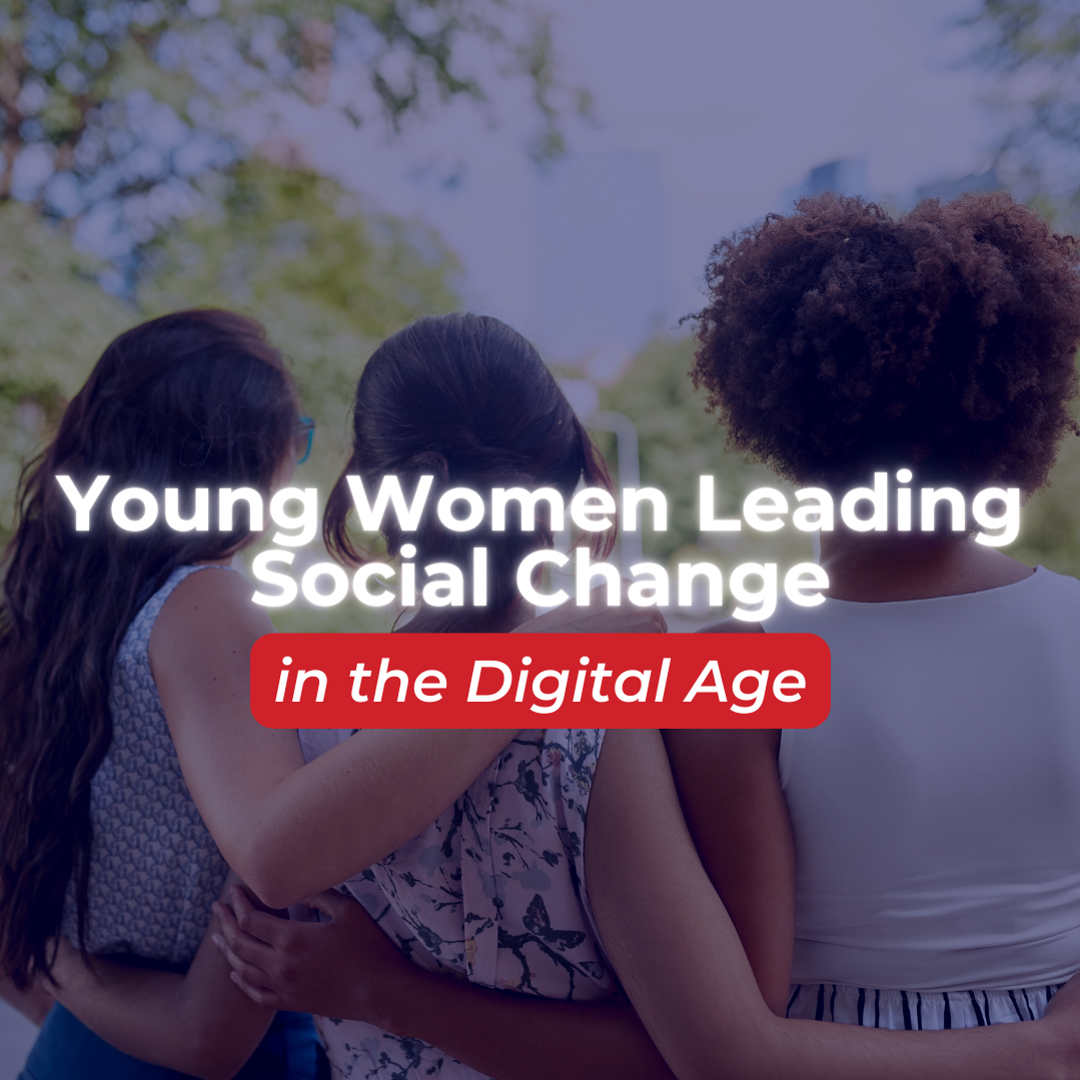CATEGORIES
#Inclusion and Impact #Social Impact #Young LeadersOverview:
- Technology is transforming activism by empowering individuals to drive change more effectively.
- Young women are redefining leadership by spearheading innovative social movements.
- Viral campaigns are driving global social change by amplifying important causes.
- Activists in the digital space are tackling challenges and finding creative ways to overcome them.
Equipped with social media and technology, activists no longer have to protest in the streets. Young women, in particular, are using their voices to stand against oppression, and connect with people all over the planet. With the help of viral campaigns and small grassroots movements, they are changing the way social movements take place. Amalgamating passion with digitalization, they are ushering in a new age of activism. This is on track to be more organized and more effective than activism we have witnessed in the past.
Definition of Digital Activism
Digital activism pertains to efforts to advocate for social change through technology and online campaigns. It is an effective alternative approach in voicing out issues to the internet rather than using fliers or participating in protests.
Essentially, any form of digital counter-activism can be implemented. Posting, tweeting, or blogging helps individuals find and build communities. Activism through social media has immense potential and measurable results. This allows underrepresented people to speak out and sparks global debates on important issues.

The high accessibility of modern media platforms has transformed how campaigns are conducted and ushered in the era of virtual activism. Nearly anyone with a smartphone can contribute to a campaign or petition by simply sharing ideas. Hashtags like #MeToo or #BlackLivesMatter demonstrate the power of unified efforts in advancing an agenda.
Once a lock is placed on the gun, there may be no turning back as competition becomes ruthless. This can lead to challenges such as disinformation and the spread of hate. The sheer volume of adversity is an effective tool, but its morality remains questionable. The debate continues as movements like those of American pioneers, suffragists, and civil rights leaders reshape journalistic concepts.
Young Women Leading Global Movements
Today, violence against women, especially young women and children, persists on many fronts. Despite this, systematic efforts to bring change are growing. Young women are leading transformative social movements, addressing issues demanding urgent attention. From climate justice to gender justice, their leadership is reshaping societies.
Young leaders like Malala Yousafzai and Greta Thunberg have voiced their causes globally. Malala highlights the importance of girls’ education, even in war zones like the UK and beyond. Thunberg focuses on rallying climate advocates, showing how young girls can challenge systemic issues. Media coverage of these young women often sparks mass interest in societal change, showcasing their power and passion through compelling storytelling.
Under new leadership, young women like Indian seamstress Nirmala Chinde are pioneering social movements in the age of cyber-feminism. They are creating platforms to channel their anger and drive change.
- Disha Ravi: A young Indian climate change activist, Disha co-leads the Fridays for Future movement in India. Her advocacy focuses on sustainable lifestyles and policy changes to address the environmental crisis. Be Badass
- Kirthi Jayakumar An activist advocating for women’s rights and promoting peace, Kirthi founded The Gender Security Project. She also created the Saahas app to support survivors of gender-based violence.Wikipedia
- #IWillGoOut Campaign: Initiated by young feminists, this movement used social media to organize protests nationwide. It highlighted women’s right to access public spaces free from harassment and rallied support for gender equality.Oxfam Policy & Practice
- Why Loiter? Campaign: Inspired by the book Why Loiter?: Women and Risk on Mumbai Streets, this movement urges women to reclaim public spaces and challenge patriarchal norms. Social media and demonstrations advocate for women’s right to loiter without purpose, just like men.
Many young women are also impacting their local communities by addressing issues like healthcare, racial justice, and LGBTQ+ rights. Social media has brought their grassroots efforts global recognition, showing the interconnected nature of activism. These leaders stand out for their courage to confront systemic challenges and their empathy for the people they serve. By sharing stories and pushing for collaboration, they are breaking barriers and inspiring a new wave of activists.
Harnessing the Power of Social Media
Social media has transformed activism by offering a platform to spread awareness, gather support, and instigate change. For young women leading movements, it acts as a loudspeaker and communal space. Their voices resonate far beyond traditional boundaries.

The ease of creating and sharing content on platforms like Instagram, Twitter, and TikTok empowers young women to ignite discussions with a few clicks. Hashtags like #MeToo, #ClimateStrike, and #BlackGirlMagic highlight issues and foster unity globally.
These viral movements show how one idea, when shared effectively, can become a global phenomenon. Social media helps young women in India amplify their voices and emotionally connect with audiences. Through videos, photos, and blogs, they share personal stories that inspire others to act, such as signing petitions or donating.
For example, slam poet Aranya Johar addresses gender equality and mental health through performances like A Brown Girl’s Guide to Gender. Her work sparks discussions locally and globally. Campaigns like #MeTooIndia empower women to share harassment experiences, creating an unprecedented wave of awareness and accountability.
The #IWillGoOut movement rallies young feminists to reclaim public spaces, using social media to organize protests and advocate for safety. Movements like #WhyLoiter challenge norms by encouraging women to occupy public spaces without fear, redefining freedom in a patriarchal society.
Digital campaigns humanize causes and promote accountability through real-time updates and live-streaming. By merging storytelling with digital tools, young women in India create a ripple effect, challenging norms and inspiring action.
Using social media effectively requires strategy and resilience. Activists face challenges like misinformation and harassment but address these creatively. They transform local issues into global movements through innovative content and collaborations.
Navigating Challenges in Online Activism
While online activism allows young women to lead global movements, it also comes with challenges. Online harassment and trolling take a mental and emotional toll on activists. Criticism, threats, or personal attacks are often an unfortunate reality for those speaking out online.
The spread of misinformation is another significant issue. Activists must carefully verify facts to maintain credibility and counter false narratives that could harm their efforts. Additionally, the overwhelming volume of online content makes it difficult for crucial messages to gain visibility.

The digital divide, algorithm changes, and shadowbanning create further hurdles. Limited access to technology restricts participation, while unpredictable platform policies hinder campaign reach and silence voices.
To address these challenges, young women use privacy tools, build supportive networks, and rely on trusted fact-checking resources. By staying focused and resilient, they transform challenges into opportunities that strengthen their movements and leave a lasting impact.
Emerging Technologies Shaping Activism
Emerging technologies are essential in modern activism. Tools like artificial intelligence (AI), blockchain, and data analytics are helping activists amplify their efforts.
AI analyzes social trends, recognizes patterns, and targets specific audiences, making campaigns more effective. Blockchain technology ensures transparency and accountability, especially in fundraising.
By creating tamper-proof transaction records, blockchain fosters trust in donations and campaigns.

Virtual reality (VR) and augmented reality (AR) are used to create immersive experiences that highlight social issues, allowing individuals to connect with causes in unique ways.
These technologies allow activists to engage broader audiences and offer deeper insight into the challenges they aim to address. As they advance, VR and AR will shape activism by providing tools to amplify voices, promote transparency, and mobilize people worldwide.
Conclusion
Young women are reshaping activism in the digital age, using technology and social media to drive change on a global scale. While challenges persist, their resilience and innovative use of emerging tools continue to inspire movements and create lasting social impact. As technology evolves, so too will the potential for digital activism to address global issues and empower future generations of changemakers.


